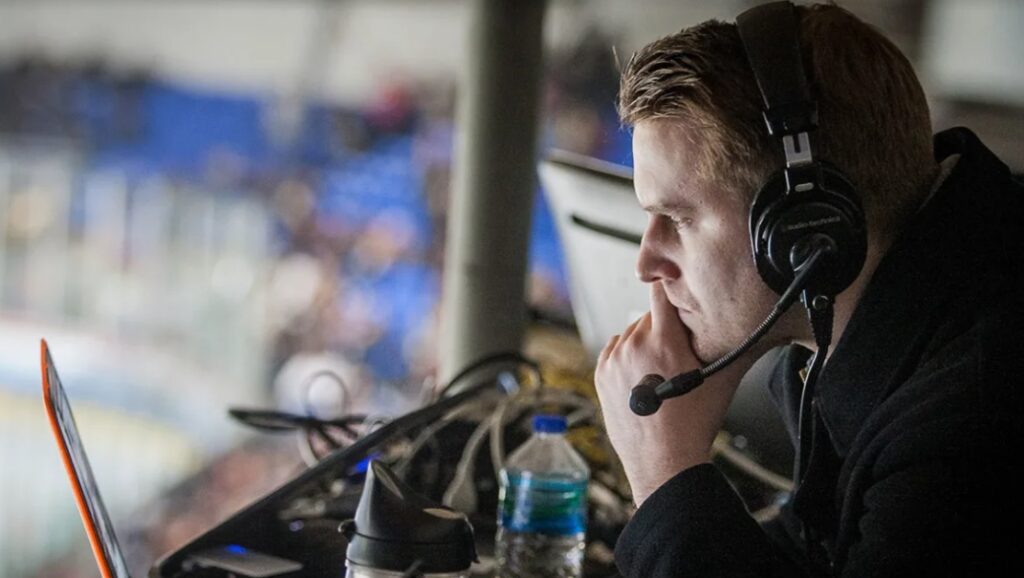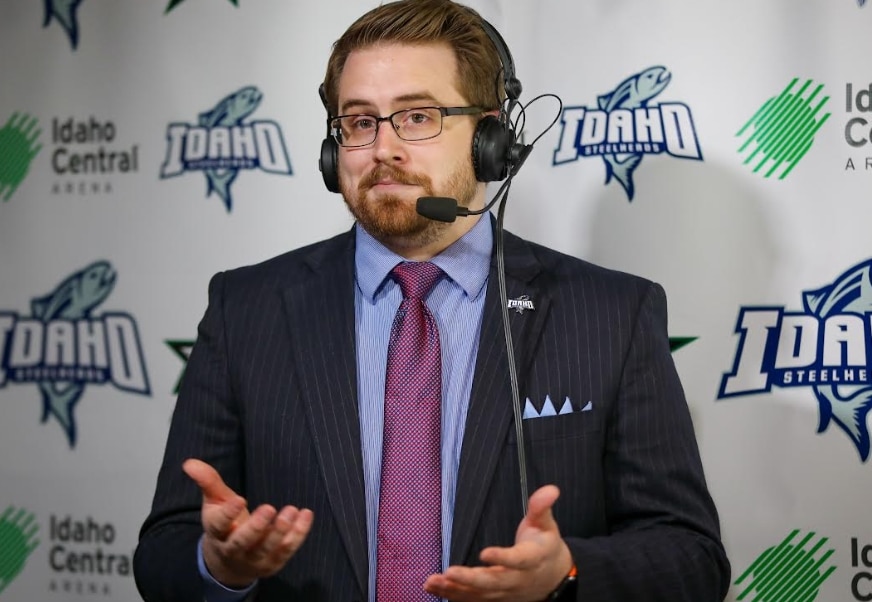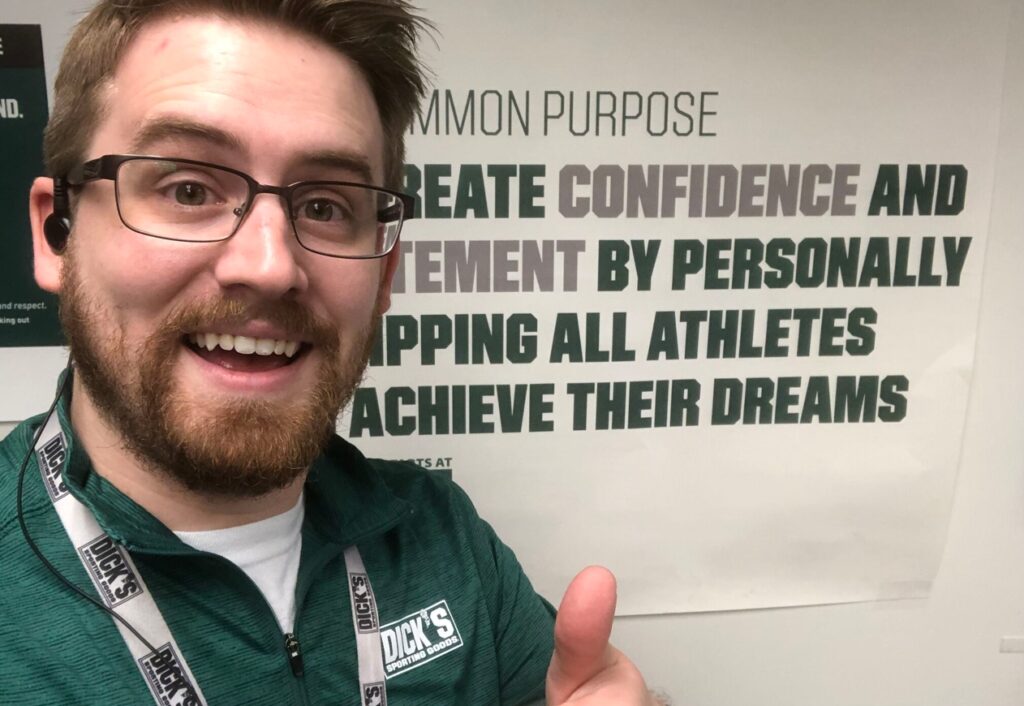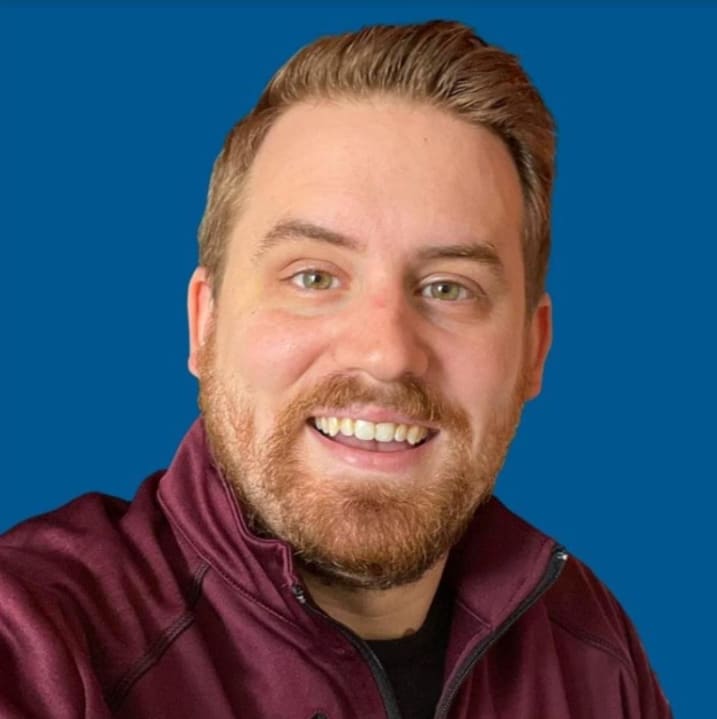Contents
Hello! Who are you?
Hi, I’m Collin Schuck. I’m a 90s kid and public relations manager for an agency based in North Carolina. I grew up just outside Philadelphia in southern New Jersey, but I’ve lived in seven different states over my life.
I was the second of two siblings to leave for college. After I went away in 2009 for school, my family said, “When your brother left for school, so did the music, and when you left, the laughter left with it.”
Admittedly, that quote seems pretty grim, but it illustrated how I’ve always been growing up: outgoing, goofy, and willing to find laughter and the positive side in most situations. There wasn’t a challenge I wasn’t willing to face – except for anything dealing with heights – and I never felt like there were situations that I could struggle with.
I was one of the top of my class, musically talented and athletic, and friendly with most people. I’ve had a lot of privilege, but I also worked hard to get what I earned.
A lot has changed in nearly a lifetime apart from that stage of my story. Now, I’m in my early thirties, I’m back on the East Coast after years of travel, and I have a beard…which was never a thought before 2020.
There are naturally things I would love to improve on both personally and professionally, but generally speaking, I’m happy…again. The journey I’ve taken over the last decade has been a rollercoaster and has grounded me to take on challenges in the future, but it was anything but fun deep down.
What is your struggle and when did it start?
This has taken a long time to admit and talk about openly, but I have a history of suffering from anxiety and depression. These struggles didn’t manifest immediately, but once they did, they were a continual presence.
My former career was in professional sports, specifically as a hockey broadcaster and media relations director. Sounds cool, right? I continued performing like I did in theatre through high school while getting to be part of an industry I always dreamed about growing up.
I traveled with hockey teams across the country, was part of the storytelling process that folks love about sports, and got access to athletes and games that many dream about. I have so many fun memories of the adventures from that career, but it was tearing me apart on the inside.

Working in sports is a lifestyle. I worked 60-70 hours a week, six to seven days a week over the course of six to nine months. Off-seasons were lighter, but there wasn’t a true break. Your identity, success, and the world around you is tied to your work.
Most teams cannot afford to pay their workers well, especially in amateur and minor leagues. Finding quality, affordable places to live was difficult, and while some teams have arranged housing those opportunities make separating from work difficult. Hobbies are also hard to keep up with due to time and finances.
It also meant moving further from my family with every promotion, missing milestone events and family gatherings that were important like holidays, weddings, and core family events.
My work environment was family-oriented, but I never felt at home, not for a nerdy theatre kid from New Jersey living in Texas, Nebraska and Idaho. Fitting in was more of a challenge than expected.
The first sign of my struggles that manifested was in my third year while living in Texas. I was really hoping to advance and move up, but that advancement felt impossible. I was extremely lucky to get the position in the first place, and all the hard work and hours put into the lifestyle did not feel like they were paying off.
I started to turn inward, spending time really only at work and in my room, closing myself off more from the world. It was a room without windows in a state I didn’t fit into, and it made me start to slip into seasonal depressive states when work couldn’t occupy my mind. I finally earned that promotion after the next season, but the depression followed me to Nebraska and then to Idaho.
I had a hard time pursuing hobbies, traveling home was expensive and I got little time off for vacations, and friendships didn’t happen outside work. The anxiety joined once I believed I couldn’t get out and if I did that I wouldn’t have the skills to succeed elsewhere. I was miserable.
How did this struggle make you feel at your worst moments?
There’s a reason why men’s mental health becomes such a big topic of conversation in November. Pride and social expectations make it difficult for many men to talk openly about their struggles and emotions without judgment or ridicule. I had trouble with both of those.
I felt like this was something I could work myself out of and fix myself, and the pressure I placed on myself only compounded my emotions. I was afraid to tell other people outwardly. I dropped hints to people in hopes someone would just ask because the humiliation of opening up felt too heavy a burden. I tried to be the happy, outgoing person I was growing up, but the weight of the world was crushing me internally.

There were two moments that really told me there was something very wrong with me.
In the summer of 2018 when I was living in Nebraska, was living in a tiny apartment with internet that barely worked but was forced on me by my apartment complex. I had four friends in town, and all were co-workers. I couldn’t afford the tools I needed to try new hobbies between rent, other bills, and trying to save money.
A new song by Ninja Sex Party–they’re a comedy band, before you ask–hit home with me and gripped at the loneliness I felt. I haven’t cried that much in a long time. I played that song on repeat, went into the shower, and cried for about a half hour to try and wash away all of the feelings that had been building up over a long time. For the first time, I felt less closed off to the world and finally felt a real connection with something. I knew I had to get out of that area.
Fast forward to October of that year. I got another promotion from amateur to professional hockey and moved to Idaho into still another small apartment but one with internet.
However, the adjustment to the new organization felt tumultuous. There was no playbook or outline on how to proceed with things and now I was in charge of a travel budget that was worth more than my childhood home. I felt no sense of relief in my first few weeks, which is right when the season was starting.
On my way home from work, I stopped at Chipotle to try and cheer myself up. One of the workers gave the usual, “Hi, how are you today” greetings and I couldn’t help but say, “Honestly, not great” and proceeded to give my order. By the time I went to the register, the manager came up and said “Don’t worry about it, we’ve got you covered.” I couldn’t believe it. I went home and stared at my brown Chipotle bag and, overcome by the kindness someone showed, I cried.
Many other days, I just sat at home for 3-4 hours at a time unable to do anything else but sit and think. The anxiety of going to work or taking on the world was truly paralyzing. It’s easy to just say get up and move on, but once you’re in that loop it’s nearly impossible to get out. I had never felt more lonely and helpless in those few years, but there seemed to be no way out.
👉 Share your story: Help thousands of people around the world by sharing your own story. We would love to publish your interview and have a positive impact on the world together. Learn more here.
Was there a moment when you started to turn things around?
The pandemic was my turning point.
I was laid off in March 2020 and spent a year out of sports. At first, I was irate and felt the struggles of the world. Like everyone else, I nearly never left my apartment and transitioned to becoming a true introvert, but it was the best thing to happen to me for my health.
After four months of just being at home to play games, talk with friends over Zoom and collect a government check, I started working in retail, and even though that had its own anxiety drivers, I finally felt at ease for the first time in four years.
What changed was my lifestyle out of necessity and circumstance. I went from an exhaustive, stressful situation to working 35-40 hours a week with a routine schedule that allowed for hobbies and free time with about the same pay. I learned that I had value outside of sports and had transitionable skills beyond being in front of a microphone and camera.

I even met my long-term partner during this transitional time of my life who was supportive and encouraged me to become who I wanted to be instead of molding myself to others’ perceptions and expectations.
Most importantly, I knew my career had to change if I was going to return to feeling this way.
What steps did you take to overcome your struggle?
While I went back to sports for the 2021-22 season, that was my last season. I made the choice in December to capitalize on many people switching careers and jobs to find a new position.
It still took five months and an interview while on vacation in Venice, but I found a position that was right for me: a remote-only position that stayed in media and public relations and allowed me to choose my home, something I hadn’t had since I chose my college back in 2009. Fortunately, it also nearly doubled my salary. It was difficult to leave what I worked at for so long and so hard along with the people I worked with, but changing my lifestyle was the move that I needed. And it paid off.
There are still some battles with anxiety and depressive thoughts that I deal with, but they are few and far between the daily struggle I dealt with. I rarely feel the weight of the world, my stress levels related to work and life went from an eight or nine to a two or three, and I no longer have paralyzing anxiety.
The biggest choice I made that helped the most was to remove myself from the causes of my anxiety and depression and control what I could control. Many of my issues were linked to my career path, which forced a specific lifestyle that was all-in or get-out, so I created an exit plan without needing to lose income and followed through.
I realize I was lucky, but getting away was what I needed most. Since then, I’ve focused my free time on things that made me happy. Video games, hobbies, shows & movies with great stories, spending time with my partner and family, and adventuring are all on my high-priority list.
Finally, I’ve let myself have days where I’m not grinding at work for eight-straight hours and worked on not feeling guilty for having less to do on some days. That’s a work in progress, but knowing I cannot give 100 percent every day is a big step forward.
Have you shared any of this with people around you in real life?
I may write for a living and previously talked as well, but this is the first time I’ve fully shared my story with a large audience.
In the past, I’ve confided in my partner, my immediate family, and two or three others that have had similar issues in sports. It is very hard for me to become vulnerable like I used to in high school and college, and only the people that I trust to not judge me or feel differently for feeling vulnerable and open have been the privileged few to know what’s been really happening.
Recently, I told my boss about my past struggles, but that trust was developed with a common thread of knowing what my previous career is like, and it’s the first time I’ve opened up with another employee.
I’ve protected my core and public perception for a very long time, and now I’m finally ready to be open with others and confident enough to share my story in the hopes that it helps others. I still feel trepidation about sharing this, but I know there are many other people both in and out of sports that have gone through similar experiences.
I hope this can make a difference to know you’re not alone and even the seemingly happiest people may be dealing with inner demons every day without anyone knowing.
If you could give a single piece of advice to someone else that struggles, what would that be?
In the end, you have to find your bliss. A college professor spent an entire semester before graduation encouraging us to strive to find our bliss, whatever that may be.
Find what makes you feel not only the happiest but also the trust in yourself, and go pursue that. I wish I had heeded that message years ago to change course, but only you know what makes you the happiest even if others may not approve of it. The important people will support you no matter what, and new people will come along that will accept you for who you are and not what you project.
I spent a lot of time allowing myself to feel those emotions and search for the truest version of myself again, and while he’s not fully out there yet he’s still there and showing more every day.
While I didn’t do this out of sheer pride, go talk to someone. Many people I know that struggle with mental health have done so, and it’s good to have someone to just listen. I’m still working to get to this point, but I’m moving closer to finally accepting help from someone else. Don’t force it, but when you’re ready, seek it out.
Like I said before, the journey to get back here was arduous, but for the first time in nearly a decade, I’m finally feeling truly happy and at peace again.
What have been the most influential books, podcasts, YouTube channels, or other resources for you?
- I was inspired by others sharing their stories for the most part. While I cannot recall specific people, many people who were starting to open up about stigmas for mental health drew me to want to make a change and eventually tell my own.
- A lot of reflection and meditation. Allowing myself to search my feelings for the answers and bring back out the true version of myself is what really benefited me.
Where can we go to learn more about you?
You can find more about me on my website, or you can follow me on Instagram, Twitter, and TikTok, or connect with me on LinkedIn!
Want more interviews?
Continue reading our inspiring case studies and learn how to overcome mental health struggles in a positive way!
Want to help others with your story? We would love to publish your interview and have a positive impact on the world together. Learn more here.

